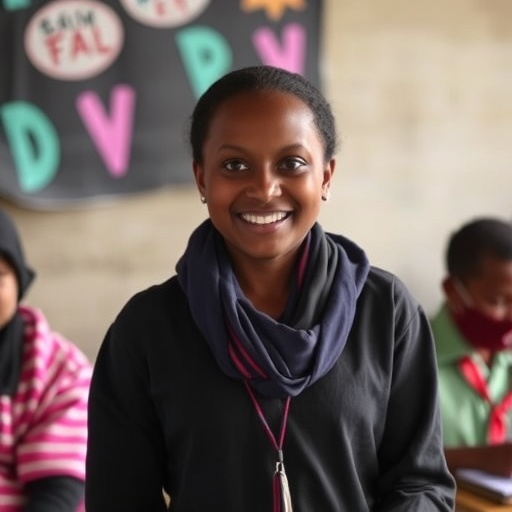Menstrual health remains a profoundly neglected area within global health research and intervention programs, despite its critical importance for the well-being and development of adolescents worldwide. A paper recently published in The Lancet Child & Adolescent Health underscores the urgent need for expanded attention on menarche, puberty education, and systematic menstrual health monitoring. This research, led by experts at Columbia University’s Mailman School of Public Health and Emory University’s Rollins School of Public Health, highlights how foundational experiences during puberty set the stage for long-term health and socio-economic outcomes.
The transition to menarche represents a pivotal biological and psychosocial milestone in the lives of adolescent girls. It signals not only a biological readiness for reproduction but also a complex interplay of physical, emotional, and social changes. Yet current public health frameworks overwhelmingly overlook this critical juncture, resulting in a cascade of missed opportunities to provide effective education and support. The study identifies early puberty education as a crucial intervention point that could greatly enhance young peoples’ understanding of their changing bodies and reproductive health.
Central to the findings is the observation that many adolescents navigate menarche without adequate knowledge or guidance. Conversations about menstruation and pregnancy risk are frequently absent or stigmatized, perpetuating cycles of misinformation, shame, and fear. The research emphasizes that such gaps in education erode adolescents’ capacity to make informed decisions and to engage with healthcare systems proactively. This deficiency has profound implications for health equity and adolescent empowerment globally.
Furthermore, the paper calls for robust national and regional efforts to incorporate menstrual health indicators into routine health monitoring systems. Currently, data on menstrual health are scant or non-existent in many countries, undermining the ability of policymakers and practitioners to allocate resources effectively or evaluate program impact. By embedding standardized menstrual health metrics into national health surveys and monitoring frameworks, governments can generate critical evidence that informs policies and intervention strategies aimed at improving adolescent health outcomes.
The authors draw from a multidisciplinary perspective, combining epidemiological data with sociomedical insights into puberty education and adolescent health trajectories. The lead author, Dr. Marni Sommer, professor of Sociomedical Sciences at Columbia University and program leader of the Gender, Adolescent Transitions and Environment (GATE) initiative, emphasizes that addressing menarche must be integrated into broader adolescent health programs. This integrative approach acknowledges that menstrual health is intertwined with gender norms, educational attainment, mental health, and rights-based frameworks.
Co-authors include an international team of researchers from Emory University, Liverpool School of Tropical Medicine, University of Queensland, Rutgers University, and the London School of Hygiene & Tropical Medicine. This collaborative effort reflects the global resonance of menstrual health challenges and the collective endeavor required to address them comprehensively. Their combined expertise reinforces the call for enhanced research funding and targeted programmatic actions, sponsored in part by leading institutions such as the Bill and Melinda Gates Foundation.
A critical insight from this work is the recognition that menarche represents not only an individual health event but also a vital indicator of population health and development. Failure to attend to menstrual health in adolescence may result in adverse outcomes, including poor school attendance, early pregnancy, and heightened vulnerability to sexual and reproductive health complications. The lack of standardized education and monitoring translates into systemic inequities, disproportionately affecting marginalized and low-resource communities.
Scientific discourse increasingly supports a holistic and life-course approach to reproductive health, wherein puberty education is prioritized alongside efforts to dismantle stigma around menstruation. The authors advocate for comprehensive curricula that integrate biological knowledge with practical skills in hygiene management and emotional resilience. These educational interventions are positioned as foundational to empowering adolescents to navigate not only menstruation but the broader transitions of adolescence with confidence and agency.
The study also addresses methodological challenges inherent in measuring menstrual health at a population level. Variations in cultural contexts, reporting biases, and infrastructural limitations complicate data collection and interpretation. The research calls for innovative monitoring tools that are culturally sensitive, adolescent-centered, and scalable across diverse health systems. Investments in such tools can revolutionize public health surveillance and ensure menstrual health receives the empirical scrutiny it warrants.
This paper is a timely contribution to the expanding field of adolescent health research. As global health priorities increasingly incorporate adolescent well-being, menstrual health must be re-centered as a critical component rather than a peripheral concern. Failure to do so risks perpetuating cycles of neglect that undermine decades-long gains in maternal and child health, education, and gender equity.
In conclusion, advancing menstrual health demands concerted efforts across sectors—health, education, policy, and research. Investing in puberty education and establishing systematic monitoring frameworks are foundational steps toward achieving these goals. The insights advanced by Dr. Sommer and colleagues represent a clarion call to global health actors to prioritize this dimension of adolescent health, ensuring that menstrual health is recognized and resourced commensurate with its profound significance.
Subject of Research:
Menstrual health prioritization, puberty education, and menstrual health monitoring in adolescent populations.
Article Title:
Attention to menarche, puberty education, and menstrual health monitoring are essential.
News Publication Date:
November 5, 2025.
Web References:
- The Lancet Child & Adolescent Health article DOI
- Columbia University Mailman School of Public Health
Keywords:
Health and medicine, Public health, Menstrual health, Adolescent health, Menarche, Puberty education, Health monitoring, Gender and health, Reproductive health, Global health research.




